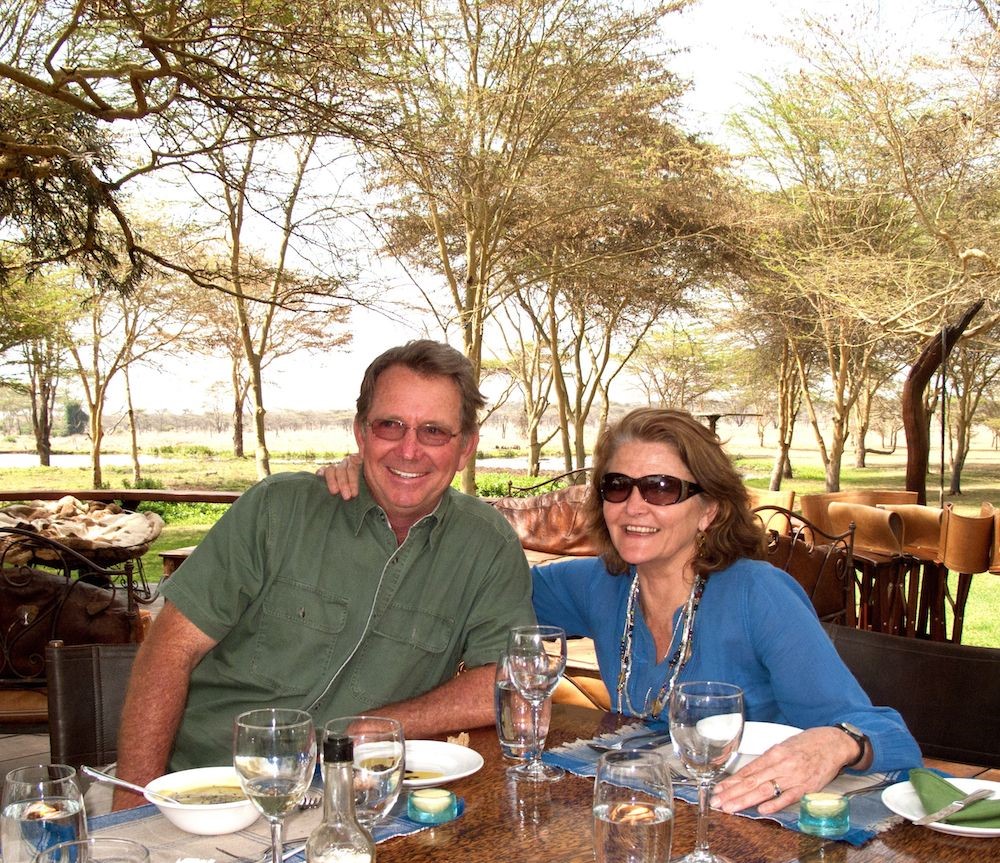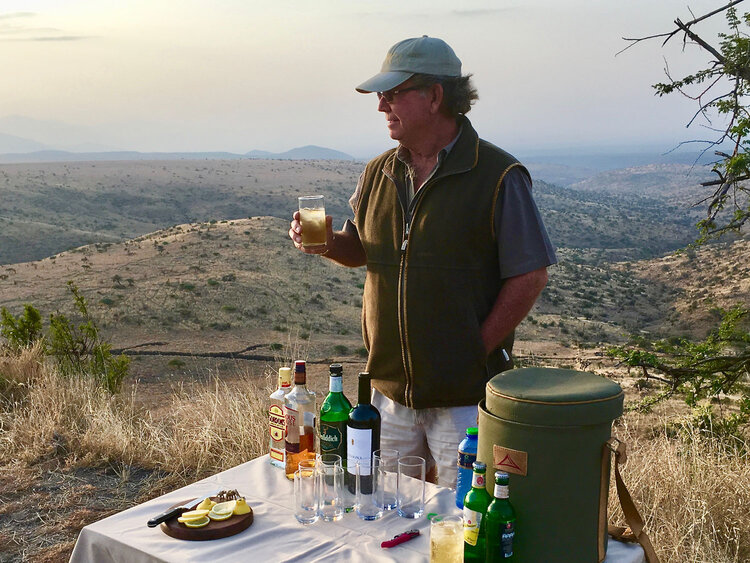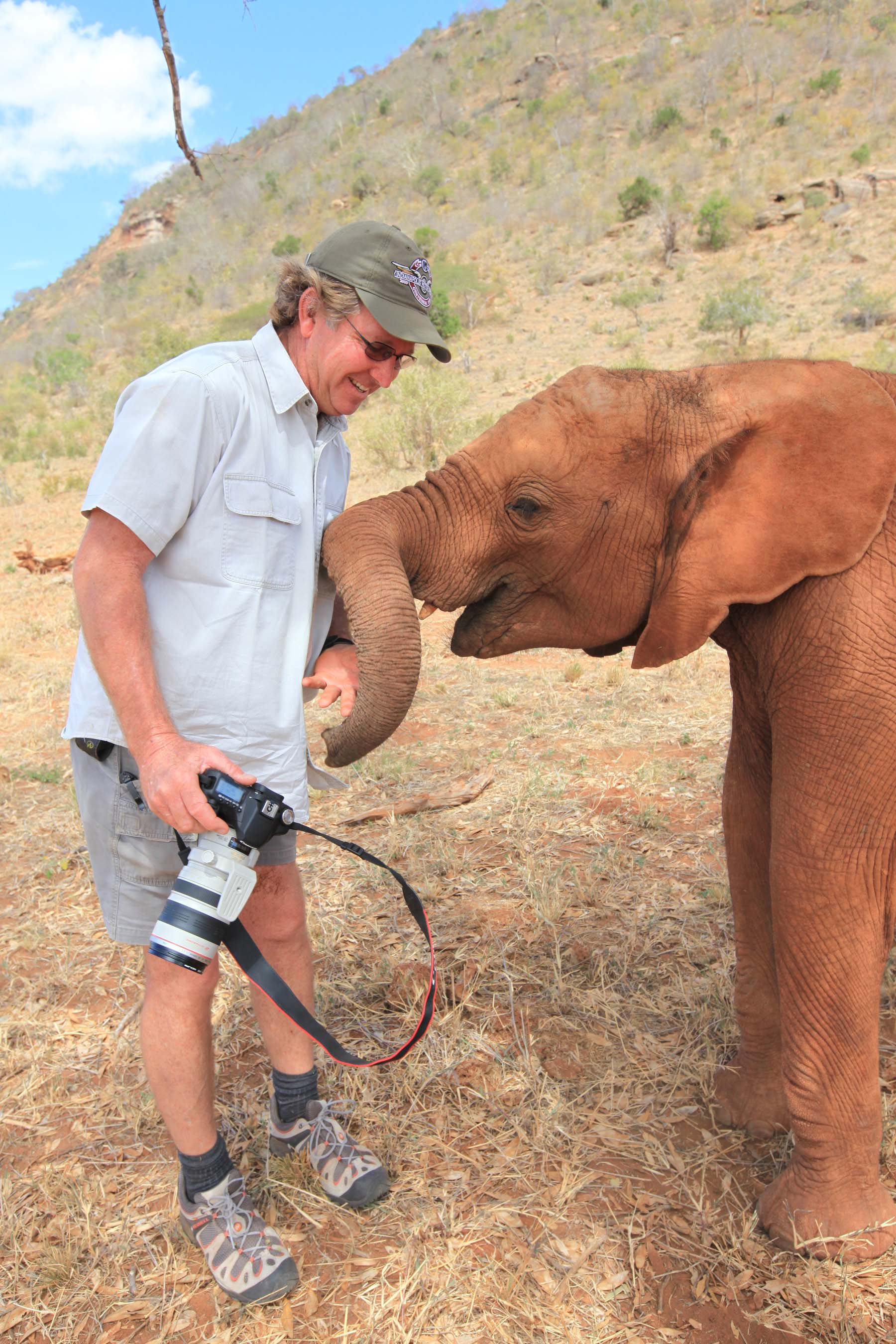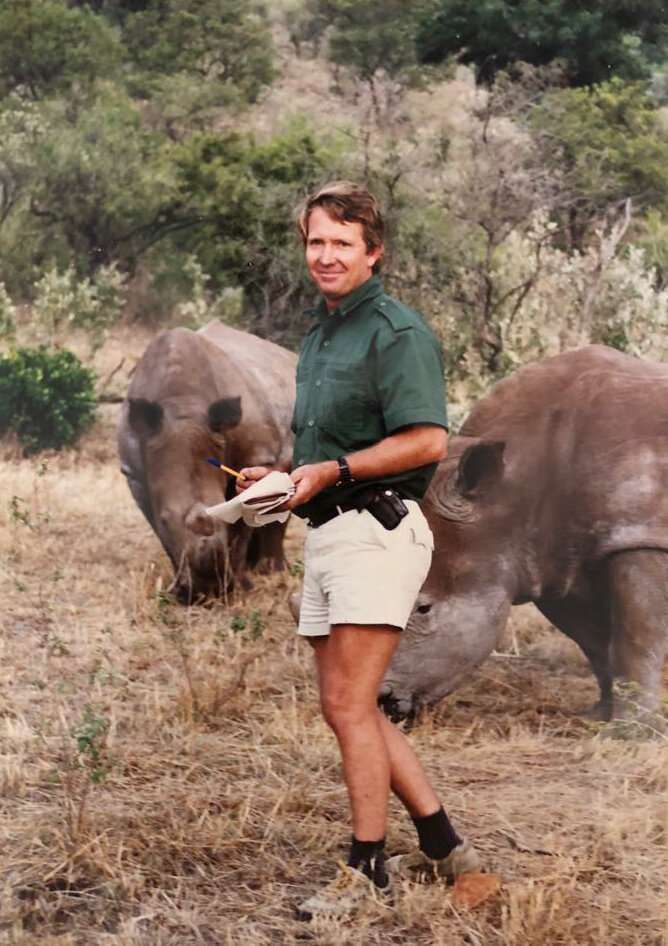Roberts Family
A true Kenyan conservation family..
Roberts Family
Kenyan born, Willie Roberts has been a huge force for good in the Kenyan tourist industry and his involvement in conservation is long-term. He has been heavily involved and instrumental in helping to foster constructive relationships between wildlife and local communities and the tourist industry in the Maasai Mara and northern Kenya.
Willie was born in Kenya and grew up with his six siblings at Lake Baringo, a remote and beautiful part of the Rift Valley. His father David died tragically when Willie was 13. The family were faced with the prospect of leaving Kenya, but Willie was determined that this was not going to happen. After repeatedly running away from boarding school in protest, his mother Betty agreed to stay and he could help run the family business.
At 19 he built his first small lodge with a friend on one of the islands in Lake Baringo. Sue, who grew up on the Kenyan coast, came to work here and three years later they were married. Sue and Willie built their first home on another island, Samatian, which has now been converted into a beautiful lodge by their daughter Caroline and her husband Ross. In 1981 Willie and Sue started an arable farm in the Northern Masai Mara. Soon realizing that the area was better suited forwildlife, Willie managed to reverse the farming trend and as a result 8,000 acres reverted to wildlife and thousands more acres were saved from the plough. He set up an association for Masai land owners, enabling them to collect wildlife based revenue on their land. In 2000 Willie established the Mara Conservancy in an area known as the “Mara Triangle”, with outstanding results. Over half the area had been a “no go” area for visitors, with rampant poaching and hunting. The area became safe for visitors and poaching stopped. The conservancy has since become a model for conservation. Willie then built a beautiful lodge with his brother Andy on Rusinga Island in Lake Victoria, which became an instant success. Willie & Sue now live in Northern Kenya where they have helped secure a large portion of land that is now within the Lewa Wildlife Conservancy. It is here that they have built their newest lodge, Sirikoi. Since he was 17 Willie has also arranged exclusive mobile safaris. He organized his first safari to Lake Turkana in the remotest part of Northern Kenya, and with his guests has explored many wild and fascinating parts of Africa since then. Over the past 30 years Willie has spent an enormous amount of time & energy helping to conserve wild animals, and helping communities who live with wildlife, benefit from its presence on their land.Willie and Sue's children Richard (Richard's Camp) and Caroline (Samatian Island Lodge and Roca River Camp) continue the family tradition of hospitality and conservation.
Willie’s son, Richard, continues his father’s legacy in the Mara with Richard’s Camp, a luxury camp located in the Mara North Conservancy. Richard, having learned his love of nature and the importance of conservation from Willie, began working closely with local communities to help them understand the crucial importance of conserving their wildlife. Richard was brought up in Ol Chorro and enjoyed a childhood not unlike his father's in many respects. With nature and conservation deep in his bones, he began working closely with local communities to help them understand the crucial importance of conserving their wildlife. In 2000, together with his partner Liz, Richard converted the Ol Chorro family home into an intimate tented camp now known as Richard's Forest Camp, and began welcoming and guiding guests from around the world.
THE PASSING OF RICHARD ROBERTS - AUGUST 2019 AT THE AGE OF 42
Written: 29 August 2019 by Will Jones at Journey by Design:
Richard Roberts died the Sunday before last, from cancer of the brain, at just 42 years old. Son of Willie, owner of the ever-fantastic Richard’s Camp, co-founder of the wonderful Mara Elephant Project, pioneer of the helicopter as vehicle for a mode of travel that has redefined what it means to go on safari, Richard was – and remains – the most glorious of men: an untamed visionary, a beautiful go-getter, and absolutely dedicated to the Mara, where he lived most of his life. Those of you in the business will have known Richard – if not directly, then certainly by reputation. My own friendship with him began about ten years ago, though I’ve known the family for as long as I’ve been in Africa-based travel. Much of what I know about anything related to conservation, I learnt from Willie Roberts, and by extension, Richard, who shared his father’s ethics, adventurous spirit, and organisational acumen. If you’ve ever had the pleasure of staying at Richard’s Camp, you’ll know exactly what I mean: it’s a first-class camp, in every respect. More than this, it has traditionally served – alongside sister lodge Forest Camp – as the traveller’s first introduction to the Mara Elephant Project (MEP) and to at-risk ecosystem conservation in general. As I understand it, the catalyst for founding MEP was the slow and unpreventable death of an elephant that had returned wounded from an unprotected area of the Mara. Set up in 2012, its anti-poaching patrols, rapid response units, collar-and-monitor operations, and human-elephant conflict mitigation practices have resulted in a massive decline in the number of Mara Ecosystem poached elephant. A testament to Richard and the team’s work. All of which is only a partial picture of the Richard Roberts I knew. A well-rounded and most liberal character, I remember once – along with my family – spending an evening in camp, polishing off a superb bottle of rice wine, a gift from previous guests, and which had a rather disabling effect on one or two gross motor skills. Subsequent attempts to walk a straight line were met with abject failure, and as civilised company collapsed all about him, Richard drew our attention to the sound of a pennant winged nightjar, happy to add his encyclopaedic knowledge about said bird to the general carnage. Indeed, most meetups with Richard and mutual friends were a delightful mix of life’s good things: the great outdoors, fine company, and a wonderful capacity for unbridled joy. Most sanguine about his diagnosis, I remember him showing me a scan of his tumour, which he described as being his Hells Angels skull, complete with fiery wings. He was exceptionally comfortable with his own mortality, a disposition summed up by a picture on his fridge, which depicted Richard and his great friend Ben Simpson stood facing the camera, on the edge of Mt Nyaragongo’s crater, its lava lake bubbling merrily behind, not a care in the world. Richard leaves behind him his wife Liz, and their children, and the rest of the Roberts family, who only last year lost Willie, to cancer as well. My heart goes out to them. He was great man, like his father, and I feel extremely fortunate to have spent some of my own life with him, out there, laughing with the world.ARTICLES OF INTEREST
WILLIE ROBERTS from Sirikoi website
OUR HISTORY - ROBERTS FAMILY from Roberts Safaris
WILLIE ROBERTS: BUDDHA OF THE BUSH By Will Jones at Journeys by Design - 2014
Go back to: Families in conservation
THE FAMILY BACKSTORY
David & Betty
David Roberts was born in Australia. He grew up in Egypt, where his parentsmade essential oil from geraniums among other things. David served with the Cameron Highlanders during World War two and spent most of his time in Italy in service. In 1948, David came back to settle in Kenya, and met Betty at the Brackenhurst hotel, an up country base for arriving settlers. They fell in love and wanted to marry but Betty was sent back to England for two years to consider her decision, as was the custom in those days. Crocodile handbags were all the rage in the early 50’s and David would take off into 'the bush' for weeks on end to shoot crocodiles. When Betty returned they married, started a family and went to live in tents on the shores of Lake Baringo. They built a lodge and fisheries in this remote place and collected a few birds and small animals for private breeding collections around the world. Soon a home had been built, there were six children and herds of pet animals including a couple of buffalo that the children would ride. The nearest shops were over 70 miles away down a very rough road, and during the rains they would be cut off for weeks on end. The children grew up in blissful ignorance of the rest of the world. When Prince Philip came to Kenya in 1963 to hand over the reins at Independence, David was asked to arrange and escort him on a trip to Lake Turkana, a very remote lake in the north of Kenya bordering Ethiopia, where he could indulge his passion for birds and fishing. While there, floods hit Kenya and Betty had to move out of her house as the waters rose until the children could dive out of the first floor window and swim up the steps! Crocodiles were to be seen swimming round the rooms and hippo were everywhere. On one occasion David flew on the inaugural Pan Am flight to America, and took the family's pet cheetah Ella as his mascot. Room service in New York was amazed at the amount of raw meet David could consume! Soon after this, disaster struck when David, aged 42, tragically died leaving Betty on her own with six children, the youngest of which was 8 months old. These were hard times and eventually, under much pressure from relatives, Betty was persuaded to return to England. Willie, then aged 13, could not accept this and began running away from boarding school, appearing at home every now and again to assure Betty that he could work and together they could keep the family at Baringo. Eventually Betty realized that Willie was deadly serious and as he had by now run away from school 3 times, had many adventures, faired well for himself in the bush and in various forests, she agreed to stay and give it a go. The rest, as they say, is history. But her legacy lives on as Ross and Caroline (her grand daughter) continue to live at Lake Baringo and run Samatian Island Lodge. Betty sadly passed away in February 2010. Over 300 people went to her home in Baringo to pay their respects and celebrate her life. There was a moving but joyful send off as her remarkable life was remembered. The party went on into the early hours of the morning with a firework display and the releasing of Chinese lanterns over the lake. She will be greatly missed.Dick & Chim
Sue Roberts' father Dick Bainbridge grew up in England and had a passion for all things to do with the sea. After serving as a navel Officer (RNVR) during World War II, he rebuilt his beautiful old 115” wooden fruit clipper Orestes. She had gun ports on her flanks, a figurehead, and grass growing out of the deck, so this was no mean feat. With his sister and a few friends Dick planned to sail to South Africa to start a new life and buy a fruit farm. Several months later they arrived in Zanzibar having been attacked by pirates in the Red Sea who they fended off with a punt gun. Dick went ahead to buy a fruit farm in South Africa but instead came back with a wife, Chim! The romance of the East African coast was too much for them and they were soon sailing to Ceylon 3000 miles across the Indian ocean to salvage 6 boats (MFV’s) that had been sunk in Trincomalee harbor by the Admiralty at the end of the war. This was the beginning of their shipping line. They started in Zanzibar where their first contract was transporting clove pickers to the Island and back every day, and this is where Sue was born. Chim was a talented artist, cook and home maker, and she loved to sail. Dick captained his ships to all the islands in the Indian ocean and they were the only regular mailboat at one time to The Seychelles, Zanzibar, the Maldives islands, Maritious and Madagascar. This was a life he loved. The company soon grew and 20 years later Southern Line owned several oil tankers a bulk cement carrier, an air charter and travel company, and a marine engineering complex. Dick now found himself confined to a desk and the magic was gone. So at 52 he sold his company, bought a beautiful old wooden sailing boat and returned to the sea where he sailed with his family for the next four years. Sue was at school in England and joined them wherever they were. Both daughters returned to Kenya, and on her first weekend back Sue met Willie at Baringo, a place she was persuaded to visit as it was so remote in those days that she would not have the chance to visit again. Aged just 19, Willie had built a small lodge on one of the Islands and employed Sue to run it.Courtesey: Sirikoi.com



